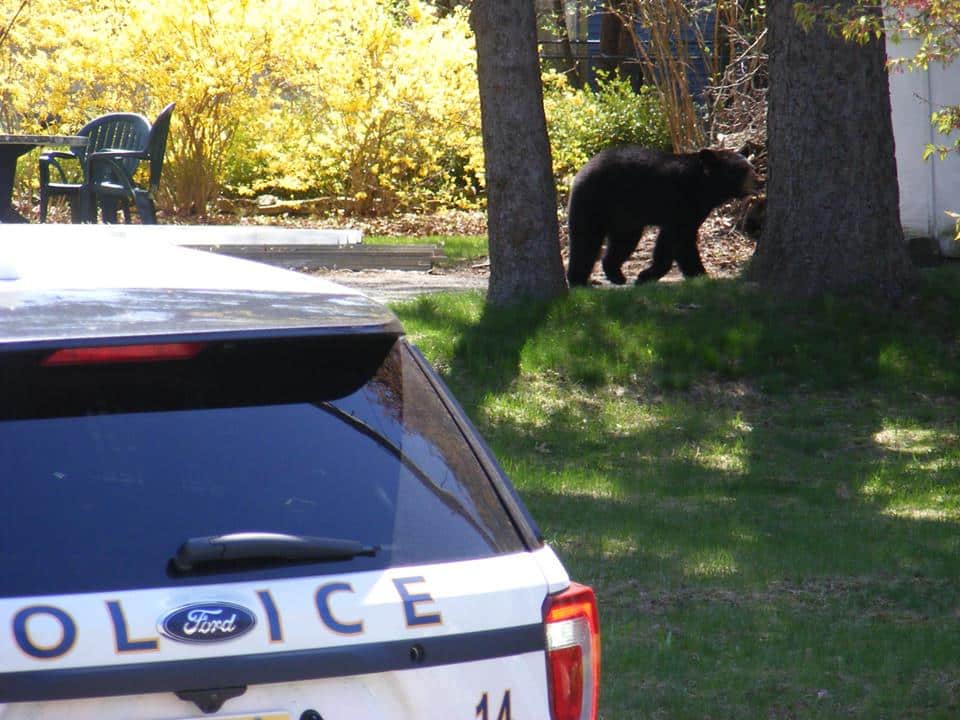
NJ Bear Warning: Hungry Black Bears are Ramping Up Activity – Here’s How to Protect Your Home!
file photo by Boyd Loving
the staff of the Ridgewood blog
Ridgewood NJ, as the leaves turn and the air chills, a critical season begins for New Jersey’s black bears: hyperphagia. This means they are entering a period of intense feeding, consuming over 20,000 calories per day to build up fat reserves for winter hibernation.
The unfortunate truth? This heightened hunger makes your unsecured trash, pet food, and bird feeders incredibly tempting targets.
The New Jersey Department of Environmental Protection (NJDEP) Fish & Wildlife is issuing an urgent public reminder: You must secure all potential food sources immediately to prevent dangerous and costly bear-human conflicts this fall.
Why the Urgency? The Fall Feeding Frenzy
“Black bears are opportunistic feeders and will consume whatever food is available,” said NJDEP Fish & Wildlife Assistant Commissioner David Golden. “They have a keen sense of smell and will investigate all potential food sources – natural or unnatural, including garbage.”
Bears are not naturally drawn to people; they are drawn to food. When bears find easy meals in human environments—like overflowing garbage cans or accessible grills—they quickly learn to associate people and neighborhoods with food. This leads to “nuisance bears” that can cause property damage and, in the worst cases, become dangerous.
Remember: Intentionally feeding black bears is illegal in New Jersey and carries a fine of up to $1,000.
Black Bear Hotspots in New Jersey
While black bears are most prevalent in the northwestern counties (Morris, Sussex, Warren, northern Passaic, Hunterdon, Somerset, and Bergen), they have been reported in all 21 counties of the state. If you live in New Jersey, proper bear safety is for everyone.
Their natural autumn diet includes plants, berries, nuts, and insects. But when those sources are scarce, a greasy grill or an overflowing trash bin becomes an easy, high-calorie alternative. Your vigilance is key to keeping bears wild and away from your property.
8 Essential Steps to Bear-Proof Your Yard This Fall
Minimizing conflicts is a community effort. NJDEP Fish & Wildlife strongly recommends these measures:
- Secure Your Garbage: This is the most important step.
- Use certified bear-resistant garbage containers if possible.
- Otherwise, store all trash in sturdy containers with tight-fitting lids inside a secure area (garage, basement, or strong shed).
- NEVER put trash out the night before collection day. Wait until the morning of pickup.
- Wash containers frequently with disinfectant to eliminate food odors.
- Rethink Bird Feeders: Suspend or remove them entirely during peak bear activity. If you must feed, only do so during daylight hours, use a free-hanging wire at least 10 feet off the ground, and bring them indoors at night. Clean up all spilled seeds daily.
- Clean Your Grill: Bears are attracted to residual grease and food smells. Clean grills immediately after use and store them securely in a shed or garage.
- Remove Pet Food: Bring pet food bowls indoors immediately after feeding. Do not leave uneaten food outside.
- Manage Compost and Fallen Fruit: Do not place meat, dairy, or sweet foods in compost piles. Clean up any fruit or nuts that fall from trees in your yard.
- Secure Livestock/Crops: Consider properly installing electric fencing to protect beehives, crops, or livestock.
- Drive with Caution: Motorists should be extra vigilant, as bears frequently cross roadways, especially during this active season.
- Educate Your Family: Create a “Bear Plan” with children, establishing a safe escape route and planning the use of noise deterrents like whistles or air horns.
Safety Tips for Bear Encounters
If you encounter a black bear, remember these life-saving tips:
- DO NOT RUN. Running can trigger a bear’s predatory instinct.
- Remain Calm and Back Away Slowly. Avoid direct eye contact, as a bear may perceive it as a challenge. Ensure the bear has an escape route.
- Make Noise and Look Big. Yell, clap, use a whistle, or bang pots and pans. Raise your arms above your head and stand close to others to appear larger.
- Recognize Warning Signs. Huffs, popping jaw sounds, or swatting the ground mean you are too close. Slowly back away without running or making direct eye contact.
- Fight Back If Attacked. Black bear attacks are extremely rare, but if one occurs, fight back aggressively.
Need to Report a Bear Incident?
Report bear damage or aggressive black bears to your local police department or directly to NJDEP Fish & Wildlife at 1-877-WARNDEP (1-877-927-6337).
For more safety information and educational resources, visit the NJDEP Fish & Wildlife Know the Bear Facts campaign online. You can also request a free bear education seminar for your school or civic group!
Join the new Saddle River Valley, Ramapo and Pascack Valley Communities Facebook group
https://www.facebook.com/groups/1931704860512551/
#news #follow #media #trending #viral #newsupdate #currentaffairs #BergenCountyNews #NJBreakingNews #NJHeadlines #NJTopStories
